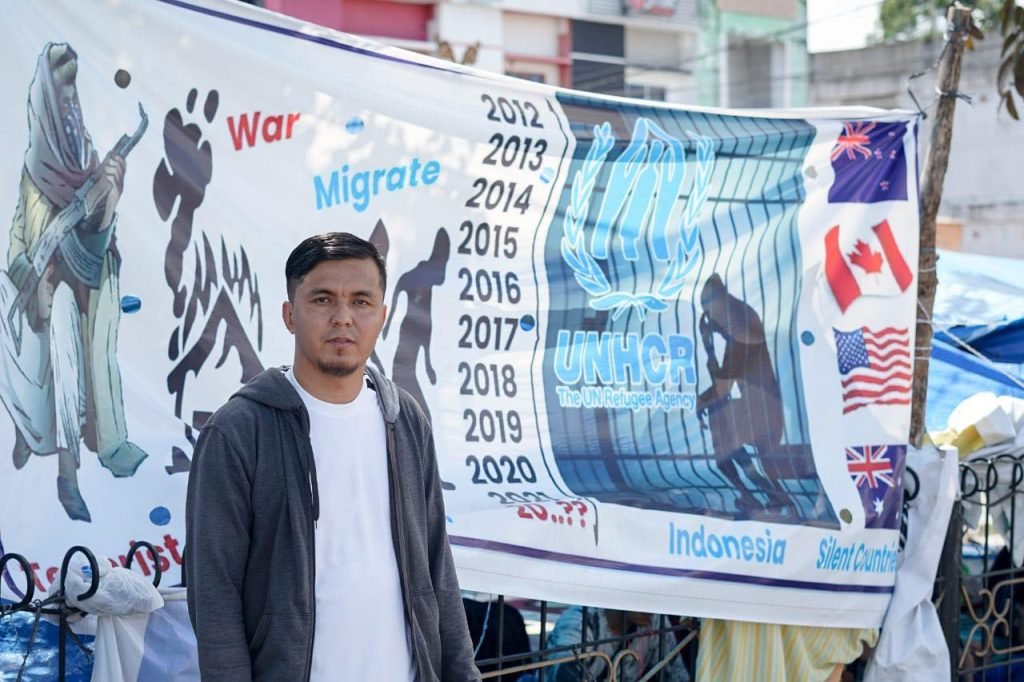
If the world was a better place 30-year-old Jamil Mohammadi might have been a full-time teacher.
After all, Mohammadi -a former computer science student of Kabul Polytechnic University- spends his free time teaching Afghan refugees in Indonesia essential computer, language and life skills, free of charge.
But the world isn’t a better place, and Mohammadi -a refugee himself- has been stuck in immigration limbo for nearly a decade, like thousands of other Hazara refugees in Indonesia.
Fleeing persecution and instability in a volatile Afghanistan, in 2014, Mohammadi’s search for sanctuary took him across multiple international boundaries, before he landed in Indonesia.
“First I went to India, then I went to Malaysia, from Malaysia I came by boat to Indonesia.”

Mohammadi had been advised that refugees who made it to Indonesia could apply for refugee status at the local United Nations High Commissioner for Refugees (UNHCR) office, after which they would be permanently resettled in a safe country.
However, any hopes Mohammadi had of finding freedom and sanctuary once he arrived in Indonesia quickly vanished, as he was immediately placed in an immigration detention centre (IDC).
“It was like a jail, like a prison,” Mohammadi said.
“When I first entered the IDC, I couldn’t go outside for three months.”
Though some of his restrictions were eased after several months, conditions were still not good for Mohammadi and the other refugees in the IDC.
“They gave us a card that allowed us to go out for three hours a day,” Mohammadi said, adding that he was only allowed to go out on alternate days.
“If I went outside Sunday I could not go outside Monday.”
Mohammadi was kept in an IDC for three and a half years before being moved to housing funded by the International Organization for Migration (IOM).
Though refugees in Indonesia are under the protection of the UNHCR, Indonesia is not a signatory to the 1951 Refugee Convention and thus is a ‘transit country’, meant for refugees to pass through on their way to resettlement. As such, they are subject to restrictions on movement and denied access to public amenities -even when not in a detention centre.
“We have to eat, we have to buy clothes. Everything we need we have to buy with that $70 a month.”
“We don’t have any access to our fundamental rights, we don’t have access to education, we aren’t even allowed to travel to another city after being here for eight, nine or ten years,” said Mohammadi.
Refugees are also prohibited from going outside at night time and from seeking employment, while in Indonesia. Though the IOM provides Mohammadi and other refugees with money for living expenses, Mohammadi says it is not enough to cover the basic needs of refugees.
“We have to eat, we have to buy clothes. Everything we need we have to buy with that $70 a month.”
Even when sick, refugees like Mohammadi are often left without assistance.
“When people get sick, we ask the IOM, ‘Why don’t you send them to the hospital?’ they say, ‘We have a limitation.’”
“Be our voice, raise our voice in the world.”
Mohammadi, like the other refugees, does not know how much longer he will be forced to live under such circumstances, nor does he know the status of his resettlement application.
“When we ask the UNHCR or IOM staff, ‘Did you send our application to that embassy?’ they say, ‘It is confidential,’” Mohammadi says.
The uncertainty has contributed to depression and anxiety for Mohammadi and many other Hazaras in Indonesia.
Mohammadi’s anxiety has worsened since the Taliban takeover of Afghanistan, as he has been unable to contact his family, since then.
“The village my family lives in, the internet has been disconnected there and to call is so expensive,” he said, adding that he has only spoken to them once in the last four months.
Recently, Mohammadi and other Hazara refugees in Indonesia have began publicly protesting their living conditions and the lack of progress on their resettlement, in front of the UNHCR office in Pekanbaru, Indonesia.
“We’ve been doing it for 34 days. We sleep on the corner of the roads and get up in the early morning.”
The protest has also extended to social media, with the hashtag #Endto10yearsinlimbo being shared by refugees in Indonesia and activists across the world.
In the memory of our young fellow refugees who ended up their life feeling alone and isolated because they lose hope and get frustrated over their uncertain fate.#EndTo10yearsinLimbo pic.twitter.com/6utz9LOk1q
— Rohullah Haidari (@RHaiadri) December 13, 2021
Mohammadi requests that the international community takes note of the protests saying, “Remember the forgotten refugees in Indonesia.”
Mohammadi also asks that Afghans across the world show solidarity with the Hazaras in Indonesia.
“Be our voice, raise our voice in the world. Write about us, talk to us. We can share our stories with you so you can share our stories with the world.”
@JournalismPopal
